In real life, loving and supportive fathers run the gamut from fun-loving and goofy to serious and insightful, stay-at-home to daily commuters, biological to chosen, cis to trans, happy-go-lucky to dour and moody.
But in superhero stories, dads tend to fall into one of three categories: emotionally distant, actually evil, or dead. Thor’s father Odin and Iron Man’s father Howard Stark both hide their emotions from their children. Batgirl’s father Commissioner Gordon is too busy cleaning up Gotham to notice that his daughter is Batgirl. The respective fathers of Invincible Mark Grayson, all of the Runaways, and Gamora and Nebula either reveal their evil plans in an unwelcome surprise or taunt their kids with their twisted philosophies. The fathers of the three most iconic superheroes, Superman, Batman, and Spider-Man? They’re all dead.
So it’s pretty exciting when a superhero story not only gives us dads who are alive and not evil but are actually pretty good at being dads. Bucking the trend, some superdads are present for their kids, supportive, and emotionally available.
With that in mind, I’ve assembled a list of the best superhero dads from movies and TV (a comics-based list would be much longer and very different). I’ve limited this list to those who fit the definition of good dad described above, and to those whose who aren’t mainly defined in the story by their absence/tragic death. So while film and television have given us some great moments with both of Superman’s dads Jonathan Kent and Jor-El, and I love Linus Roache’s performance as Thomas Wayne in Batman Begins, neither of those guys make the list. I’ve also left off folks who have some loving traits, but ultimately make destructive choices for their children—sorry, Big Daddy from Kick-Ass. Finally, I’ve left off those who are presented as bit players in the background of the larger story.
10. Yondu (Guardians of the Galaxy)
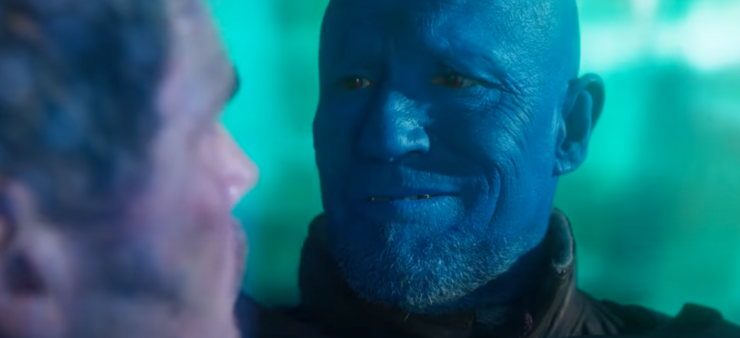
And right out of the gate, it looks like I’m breaking my own rules… Okay, I get it. For 100% of The Guardians of the Galaxy and 90% of The Guardians of the Galaxy Vol. 2, the space pirate Yondu (Michael Rooker) treats Star-Lord Peter Quill (Chris Pratt) like an annoying problem he should have solved years ago.
But then comes the end of Guardians 2. Upon learning that his biological father Ego, the Living Planet (Kurt Russell) loves him only for the way he mirrors himself, Peter comes to realize that he owes so much more to the example set for him by Yondu—something Yondu himself acknowledges by telling Peter, “He may have been your father, boy, but he wasn’t your daddy. I’m sorry that I didn’t do none of it right.”
While that line could be dismissed as an emotional sledgehammer to slam audience sympathies into place, it comes at the end of a journey of self-discovery by Yondu. Through his relationship with Rocket (Bradley Cooper), Yondu realizes that he’s spent much of his life pushing away those he loved, including Peter. No, he doesn’t make up for every wrong he’s done to Peter, but Yondu does own up to his mistakes and offer some of the most important words a father can say to a child: “I’m sorry.”
9. Tony Stark (Avengers: Endgame)
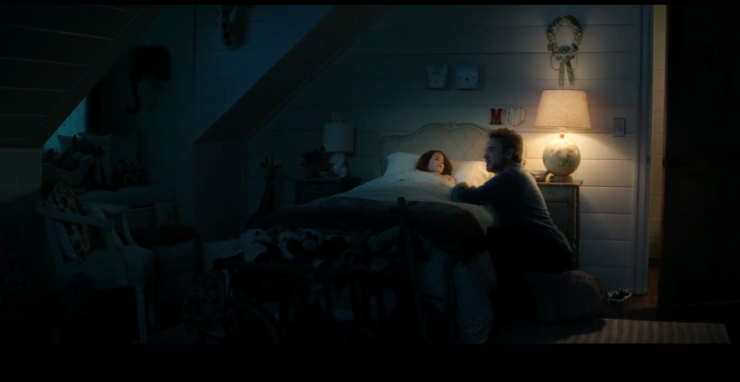
…On the other end of the spectrum, we have Tony Stark (Robert Downey Jr.), who barely makes this list for the opposite reason: whereas Yondu takes decades to finally embrace the value of his relationship with Peter Quill, we only get a tiny glimpse into Stark’s time as a father. For most of our time with the MCU Tony, he’s arrogant and hedonistic. Across his three solo films, Tony learns how to be self-sacrificing and less controlling. In his other MCU appearances, Tony’s arc shows him learning how to be a mentor and a leader, most notably through his interactions with Spider-Man (Tom Holland).
After the five-year-jump in Avengers: Endgame, Tony has moved on. Having traded in his fancy life among the New York elite for a quiet country home with his wife Pepper (Gwyneth Paltrow), Tony now puts his family above everything else, including raising his little daughter Morgan (Lexi Rabe). It can be argued that Morgan, who only appears in two scenes with Tony, exists only to add schmaltzy stakes to Iron Man’s story, like a cute kid added into the final seasons of a dying sitcom.
But that misses the role Morgan plays in Tony’s story. His love for her not only inspires him to participate in the Avengers’ time heist and help them restore their loved ones but also drives him to do it right, to make sure that she’s not erased. With Morgan, Tony becomes the man he was always meant to be, even when he was partying and shooting dice in Vegas: a charming and brilliant person, committed to bringing up the next generation into a better world.
8. Clark Kent (Superman & Lois)
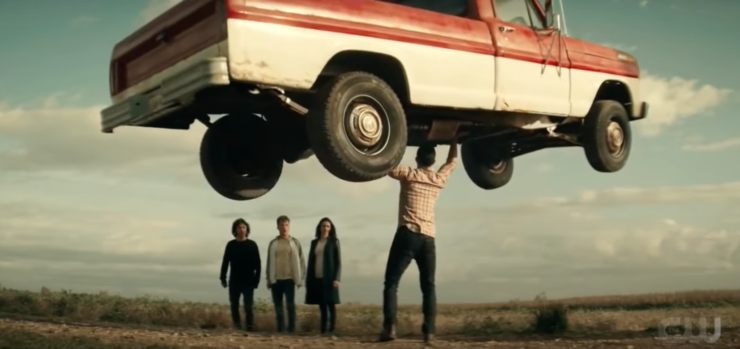
For decades now, writers have worried that Superman doesn’t connect with modern audiences. “He’s too perfect, he’s too invincible,” these writers complain, and they’ve tried to change Superman to reimagine him for these readers/viewers. Some of these changes were relatively successful, such as the not-quite-invincible Superman from John Byrne’s Man of Steel comics and the Justice League cartoon show. But more often than not, these creators took the boring and easy way out by making Superman angsty, if not outright evil.
But over the past ten years, it seems writers have finally figured out a better plan: make Superman a dad. Yes, this conceit had a disastrous beginning in the (otherwise pretty good) Superman Returns, which makes Superman into a deadbeat. However, since longtime Superman scribe Dan Jurgens gave Superman and Lois a son, Jon Kent, in Convergence #2 (2015), writers have reimagined the Man of Steel as fallible and vulnerable, without taking away his power.
The CW series Superman & Lois doubles down on this approach by giving Superman (Tyler Hoechlin) two sons, Jonathan and Jordan (played by Jordan Elsass and Alex Garfin, respectively). Each week, the show brings us plenty of super-powered, multidimensional action. But its real tension comes from watching Superman being honest with and supportive of his sons, making his love for them into both a strength and a vulnerability more immediate than exposure to kryptonite.
7. Jefferson Pierce (Black Lightning)
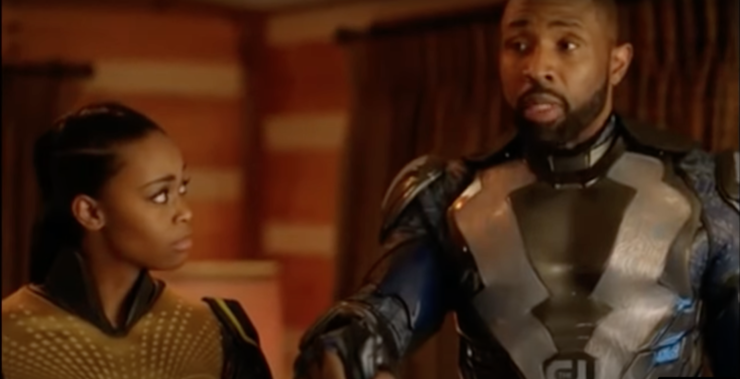
If Superman ever needs help balancing the role of being a superhero while raising super-powered kids, he can always seek out advice from his fellow Arrowverse hero Black Lightning (Cress Williams). Like Superman, Black Lightning devotes both his civilian and superhero lives to inspiring others, in the former case by serving as a high school principal devoted to the safety and wellbeing of his students.
Much of the series’ best episodes follow Jefferson as he does his best to support and guide his daughters Anissa (Nafessa Williams) and Jennifer (China Anne McClain), a task made more difficult when they both manifest their own powers. Throughout the show’s four seasons, Jefferson makes mistakes and often disagrees with his daughters. But he never acts out of anything but love and respect for them, even as he sometimes struggles with their identities as the superheroes Thunder and Lightning.
No episode better illustrates this dynamic than when Jennifer discovers her electrical powers towards the end of season one. After Black Lightning is killed in an attack from Tobias Whale (Marvin “Krondon” Jones III) and Painkiller (Jordan Calloway), Anissa fends them off using her Thunder powers while Jennifer uses electricity to recharge her father. Although the scene is full of larger-than-life superhero action, complete with powers and costumes, it is at its heart a moment of two women seeing their father at his weakest and restoring him through their love.
6. Trigon (Teen Titans Go!)
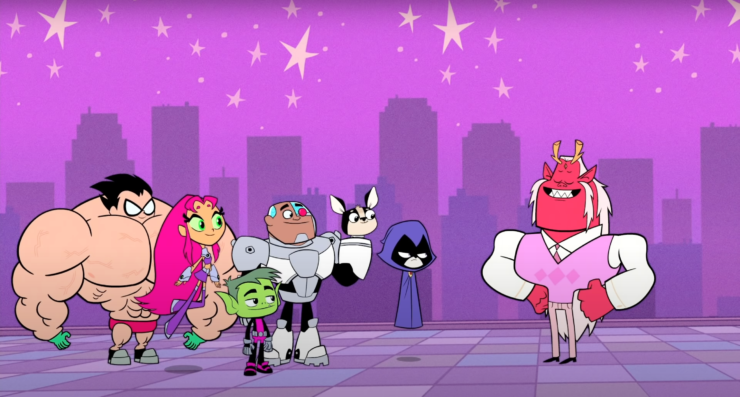
Yes, Trigon is a demonic overlord from an alternate dimension who constantly tries to turn the Earth into a burning hellscape. But as Teen Titans Go! reminds us, he’s really just a dorky dad who loves his daughter Raven.
Okay, I admit that the rubric I described earlier should preclude Trigon’s inclusion on this list. But there’s one thing that Trigon has going for him, something possessed by no other superdad: he’s an unrepentant dork. With his doofy smile and terminally uncool sweater vest, Trigon represents quintessential dad-ness, without a very handsome Paul Rudd or Jesse L. Martin around to make it look cool.
Plus, he truly wants the best for his daughter. And for a demon man, what could be better than destroying the earth and swallowing the souls of her friends? It all shows that he does care.
5. Scott Lang (Ant-Man)
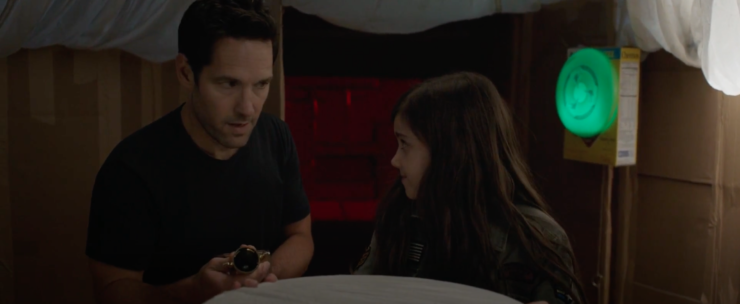
Like many cute kids in superhero stories, Cassie Lang (Abby Ryder Forston) runs the risk of being seen as a plot device meant to shave off any rough edges of ex-convict Scott Lang (Paul Rudd). But director Peyton Reed and his team of screenwriters manage to make the father and daughter relationship feel vibrant and complex. That’s especially true when it comes to Scott’s relationship with Cassie’s mom, his ex-wife Maggie (Judy Greer, underused once again), and her step-dad Jim (Bobby Cannavale), who are always able to put aside their differences to do what’s best for her.
In fact, it’s Cassie who consistently brings Scott back to reality, no matter how far out things get. That grounding happens literally on a plot level, when his thoughts of his daughter pull Scott out of the Quantum Realm in Ant-Man and when a teenage Cassie (played by Emma Fuhrmann) reorients him after the Blip in Avengers: Endgame. All that, and he builds a giant ant-maze to keep Cassie entertained while he’s under house arrest!
Throughout his several movie appearances, Scott has been a thief, a superhero, a time-traveler, and a convict—but each time, we’re reminded that “father” is the identity closest to his heart.
4. Victor Vásquez (Shazam!)
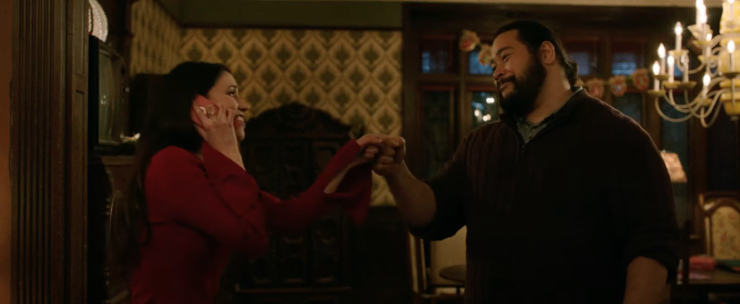
In a lot of ways, Shazam! is a strange, uneven movie. Parts of it are genuinely delightful, with Zachary Levi playing an adult superhero with the mind of young teen Billy Batson (Asher Angel). In between these goofy scenes, director David F. Sandberg pulls from his horror roots to film some genuinely upsetting stuff, including the villainous Dr. Sivana (Mark Strong) unleashing demon hoards on his enemies.
These tonal shifts paint a picture of a world filled with both wonder and real darkness, while the presence of the latter makes kindness all the more important and necessary. And that emphasis on kindness means that Billy Batson’s foster parents Victor and Rosa Vásquez become two of the movie’s most important heroes. Cooper Andrews plays the part with a gentleness to match his sizable frame, making Victor the warm-hearted center of a buzzing foster family which includes Billy’s five new brothers and sisters.
No matter what horrible things happen to Billy, including a heart-breaking revelation about his mother, Victor is there for him. Striking the perfect balance between giving the boy enough space and offering attentive support, Victor is an ideal model for bringing love and hope into a sometimes cruel world.
3. Joe West (The Flash)
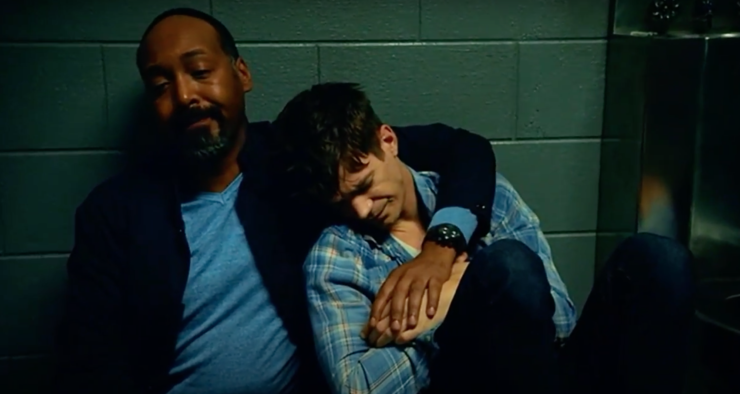
On paper, making Joe West the adoptive father of Barry Allen seems like a disastrous idea. Not only does the move solidify the relatively recent revision to Barry’s origin story, in which his father Henry was framed for the murder of his mother Nora, but it makes things a bit odd when it comes to the love of Barry’s life, Iris West. I mean, aren’t they basically brother and sister now?
But after one look at Joe’s proud, loving smile, and all those pesky questions go away. We’re just happy that Barry has someone in his life who loves him that much. Played as a sentient ball of kindness by Jessie L. Martin, Joe West endures with a smile every weird plot thread the long-running CW series throws at him, including multiple realities, another speedster son, and a daughter who develops mental abilities while still in utero.
Like any CW show that runs past two seasons, The Flash gets pretty silly, and like any story about Barry Allen, audiences are asked to forgive some pretty bonehead moves. But we watch it all just so we can see Joe give Barry one more proud, beaming smile.
2. Mr. Incredible (The Incredibles)
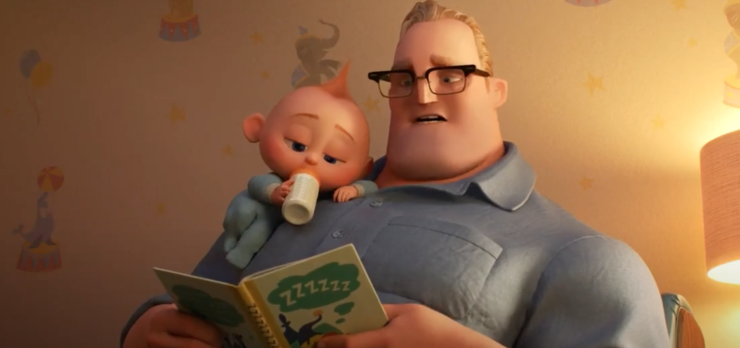
In the world of The Incredibles, superheroes are born, not made. But as the two films have shown us, super dads face more of a learning curve. And that’s not always an easy process for Mr. Incredible (Craig T. Nelson), a guy who seems to have everything. After all, when we meet him at the start of the original The Incredibles, he’s the world’s greatest superhero, loved by all.
But throughout The Incredibles and The Incredibles 2, Bob Parr, aka Mr. Incredible, must radically alter his self-perception and his goals. In the first film, Bob lets his desire for the good old days lead him right into a villain’s trap, one he only escapes by realizing his love for his family. In Incredibles 2, Bob takes the next (and most important) step, moving out of the spotlight and into a very unfamiliar role, becoming the homemaker while his wife Helen, aka Elastagirl (Holly Hunter), brings home the bacon.
And you know what? He does a great job! Yes, he’s barely keeping the kids alive and hardly saving the house from destruction, but sometimes that’s a superheroic feat all by itself. And rather than throw a fit and run off to pamper his fractured ego, Mr. Incredible does the best he can for his family, and that’s about as incredible as it gets.
1. Jefferson Davis (Spider-Man: Into the Spider-Verse)
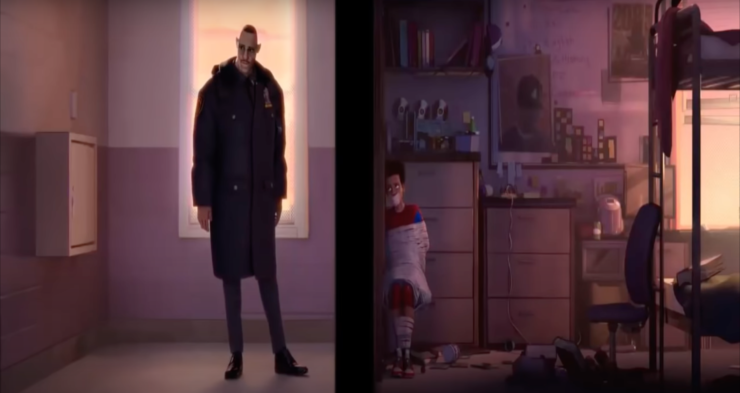
Honestly, Jefferson Davis (Brian Tyree Henry) shot straight to the top of this list on the back of the “I love you, dad” scene alone. Rather than let his son (Shameik Moore) walk alone through the old neighborhood, Davis picks up Miles and drives him right to the front of his fancy new science school. And then, he refuses to leave until everyone can hear father and son exchange “I love you’s.”
Of course, the moment mortifies Miles, and it is very funny. But that’s not what the scene is about. Jefferson isn’t trying to embarrass his son. He’s making sure that Miles knows that his father is proud of him and that he should also be proud of all he’s accomplished. He doesn’t want Miles to care about all those eyes on him, all those great expectations that he feels.
Nothing captures that better than the scene right before the film’s climax after the other Spiders have webbed up and left Miles behind, convinced that he can’t do what they need him to do. Still caught in the webbing, unable to move or talk, Miles listens as his dad comes to the door to reconcile after a fight and talk about the death of his brother Aaron, Miles’s beloved uncle. In one of the most emotionally vulnerable scenes in any superhero film, Jefferson lays it all out. He doesn’t force Miles to answer him, he doesn’t lash out. Instead, he admits his sorrows and his fears, but most importantly, he expresses the immense pride he feels for his son: “I see this spark in you—it’s amazing, it’s why I push you. But it’s yours. Whatever you choose to do, you’ll be great.”
In that one scene, Jefferson captures both the joy and pain of being a father. It can hurt to love someone so much, to see greatness in them that no one else sees, not even the child themselves. And yet, it’s the most exciting and humbling thing in the world to know that you get the responsibility of helping that person make their own way in the world.
Being a dad is a great responsibility that’s not always embraced in superhero movies, but I can’t imagine anyone doing it better than Jefferson Davis in Into the Spider-Verse.
Joe George’s writing regularly appears at Bloody Disgusting and Think Christian. He collects his work at joewriteswords.com and tweets nonsense from @jageorgeii.










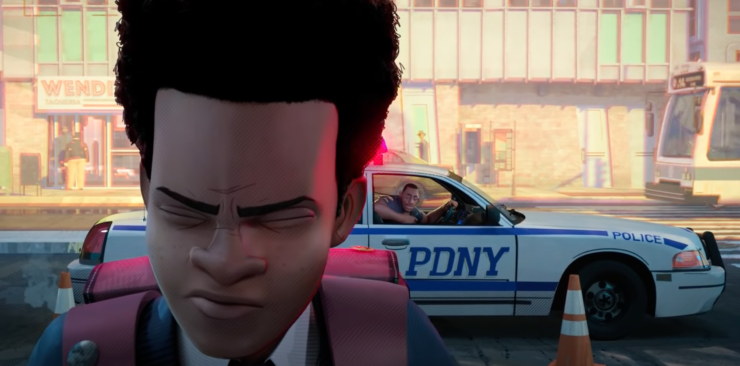
“Batgirl’s father Commissioner Gordon is too busy cleaning up Gotham to notice that his daughter is Batgirl.”
Not always. There are some versions where he knows, either overtly or tacitly (as in the classic Batman: The Animated Series episode “Over the Edge,” where Gordon basically revealed at the end that he’d known all along while still leaving it unspoken).
As for #1 on your list, yeah, a great movie and a great dad, but I remain bewildered by the choice of his creators to name an African-American character after the president of the Confederacy. For that matter, why are so many black comic book characters named Jefferson? In addition to Davis and Pierce, there’s Jefferson “Jax” Jackson from Legends of Tomorrow.
My guess is an implicit association after The Jeffersons? Though he was George Jefferson, and that implies George Washington and Tom Jefferson, founders of American Independence and OG Presidents. Unfortunately, Tom Jefferson is still dogged by [unproven!] accusations of molesting his servant girls by Fawn Brodie, who insisted that he was infatuated with half-black children because of his excessive use of the word mulatto. (Period use was to indicate soil color for farming. She insisted on using a 20th century definition of a hundreds-year-old word, among her many other inaccuracies.)
@2 Genetics have shown the accuracy of the belief that Hemmings bore Jefferson’s children.
Monticello Affirms Thomas Jefferson Fathered Children with Sally Hemings | Thomas Jefferson’s Monticello
More information on Washington and Jefferson as names in the African-American community can be found here:
Washington: the ‘blackest name’ in America (nbcnews.com)
@2/reagan3: I gather it was common after the Civil War for freed slaves to adopt surnames of US presidents like Washington, Jefferson, and Jackson (despite what we now know about those presidents’ racism). It’s more likely that the different fictional characters including George Jefferson were named in acknowledgment of that real practice, rather than one character being named after the other.
But Jefferson Davis (the Marvel character) was created only 10 years ago. And apparently I’m not the only one who thinks it was a problematical choice of character name, since in a comic released earlier this year, he legally changed his name to Jeff Morales.
Re: #9 Tony Stark, and “but also drives him to do it right, to make sure that she’s not erased”
I love almost everything about Endgame — EXCEPT the way they chose to NOT use the time stone to erase the prior five years. Imagine: First there’s a year in which suddenly the workforce needed to harvest & process food is cut in half. Sure there’s also fewer people to feed, but that’s not how economics works. More food is spoiled than the decreased supply will cover. Over four years things slowly get back to a new equilibrium — and suddenly the world needs to increase its food supply by double. Same for housing – there’s going to be massive damage to the infrastructure from the initial shock and inevitable accidents and fires. That’s followed by four years in which people work very, very hard to reach an equilibrium – and then suddenly the number of people who need housing is suddenly doubled. And not the ones who suddenly reappear aren’t all going to be nice about letting go of the nice places they *used to* own.
The inevitable (INEVITALBE) result? Massive global starvation and homelessness, vicious internal violence over limited resources, governments collapsing or reverting to irreversible authoritarianism, wars that take on the own momentum… If you think about for even ten seconds, this is INEVITABLE.
And that’s just what would happen on Earth.
OK, OK, it’s just a comic book movie. Let it go. Enjoy the rest of the movie, embrace the fact that it’s an extreme example of “less than the sum of its (extraordinary!) parts”, and try not to think about the horrific consequences of their “solution”.
Tony was faced with an unbearable choice: He figured out how to restore the life of trillions of sentient beings that Thanos had murdered. He could do it peacefully, by using the time stone to completely turn back time. But that would mean sacrificing his daughter (one who might be born in the new timeline, but would never be the *same* daughter). Instead, he chose a middle way, one that would save trillions of lives, but kill billions of others.
I get it: Having written themselves into that corner, there’s NO WAY the screenwriters would address the utter darkness of that conundrum. So instead they insist that everyone (including audiences) pretend there’d just be a little bit of happy awkwardness. And for the sake of enjoying the MCU, I’ll do it — after 20 amazing movies, they’ve earned that massive case of hand waving.
But let’s not pretend that Tony’s status as a father led him to “do it right”. He did it selfishly, and with terrible consequences. It’s an understandable selfishness, and forced on the character by questionable screenwriting choices, but it’s a genocidally lethal selfishness nonetheless. The less we think about it, the better.
@5/Anne: Except Endgame did something vanishingly rare in movies: It used a scientifically valid model of time travel in which it’s impossible to “erase” an existing timeline, merely to create a parallel history alongside it. The idea of “erasing” a moment in time is a contradiction in terms if you think about it. There would have to be a “before” version of the moment preceding the change and an “after” version following the change — but how can a single moment come after itself? It’s meaningless. The only way there can be two versions of a single moment is if they’re simultaneous, not successive. They would coexist, rather than one replacing or overwriting the other. The “erasure” model is preferred by most time travel fiction because the stakes are higher that way, but it’s a physical impossibility and a logical absurdity, and thankfully Endgame goes for the more plausible model instead.
I mean, there was that whole scene in the movie where Bruce explained to Rhodey et al. why the “Back to the Future” model usually used in fiction is an impossibility. The movie made a point of establishing that the past five years couldn’t be unmade. Even if they created a new timeline where the Snap didn’t happen, the original timeline where it did happen would still exist, and its people would still be suffering. So reversing it in the present instead of the past was the only valid way to do it. (This is also why it was possible to destroy the Thanos from 2014 without altering anything subsequent in the MCU timeline — because change only creates a parallel history alongside the original history.)
Then again, I have no idea if Loki is staying consistent with that more plausible model of MCU time travel. I haven’t seen it yet.
@1. ChristopherLBennett: My assumption is that Grandpa Davis, given his parenting turned out one son who refused to pass his surname on to the next generation and another who was a full-blown villain, was a towering jerk with a nasty sense of humour.
I also like to believe that (A) Jefferson was mostly raised by his paternal grandparents – hence his willingness to carry the surname himself, out of love & respect for them – and (B) that his friends on the force tend to call him ‘Airplane’ Davis.
I don’t know, depends on how you look at it. It sounds like sweet justice to me to have an honorable man with the same name as the traitor who would be spinning in his grave at the notion of a Black police officer. If we go on to live in a world where the name “Jefferson Davis” is first and foremost associated with this character by the culture at large, then the Confederacy has truly lost the war.
@8/Telly: Well, I don’t think Marvel agrees, given that they’ve just changed the character’s name to Jeff Morales. That seems like an admission that it was a bad idea in the first place.
I take that to mean Marvel got nervous. These companies, particularly those owned by the Mouse, are rarely brave or nuanced or willing to challenge our thinking about anything. What’s safe and what’s expedient wins the day. It’s whatever message that can easily fit within a headline or a tweet or a dialogue balloon.
But my point stands. The same thinking that Black culture used to take the N-word and reshape its meaning within the culture could be applied to a man’s name as well. All it takes is time and thinking, which unfortunately our popular culture no longer has.
@10/Telly: “The same thinking that Black culture used to take the N-word and reshape its meaning within the culture could be applied to a man’s name as well.”
Except the character was created by a white writer, Brian Michael Bendis.
@6/Christopher: That might have been a plausible explanation, except for two things:
First, the movie didn’t use a scientific explanation for time travel – they used technobabble. Time travel doesn’t exist. The screenwriters were free to made up any rules they wanted, and the same rules they made up that allowed Thanos to reverse time in Infinity War should have allowed the Avengers to reverse time as well.
(As for the danger of creating a parallel time line in which they didn’t reverse the Snap – if parallel timelines exist at all, then that time line already exists. You can’t not-do something because of what may or may not be the effect in a parallel timeline – that way madness lies.)
And secondly, that’s not the explanation the movie gave. Tony described it as a choice, not as a scientific necessity. It came just to the edge of being explicit that Tony didn’t want to lose his daughter. He put it in words about not changing anything else, but the visual clues were all there.
Once the screenwriters decided the only way to demonstrate Real Stakes was to have five years pass, the internal logic of the story were stuck them with a narrative in which any choice either 1) would be one whose tone (depressing erasure of every child under 5 or a horror of world-wide war over limited resources) was completely at odds with every preceding movie, or 2) would require a massive amount of handwaving away the inevitable horror. They chose latter, and like I said above, I’m OK with that for the sake of the continuing enjoyment of the MCU.
My point was not to criticize the screenplay, but to support the handwaving. Tony’s fatherhood inspired him all right – it inspired to insist on the solution they took DESPITE the horror it would inevitably unleash. The only way to enjoy the movie is to ignore that part of it, not to focus on it by pretending that Tony’s fatherhood inspired him to the “right” choice.
@12/Anne: “First, the movie didn’t use a scientific explanation for time travel – they used technobabble.”
No, you’re wrong. As I said, every other movie uses technobabble nonsense, but the producers of Endgame consulted with physicists and constructed a model of time travel that’s consistent with what actual scientific theory says about time travel. You know that scene where Tony is constructing that holographic model that convinces him the time travel could actually work? The “technobabble” he reels off in that scene is not babble at all, but is grounded in actual physics. The filmmakers did their homework.
This is what’s so frustrating to me as a hard-SF writer/fan familiar with physics. Most time travel fiction has advanced a model that’s complete gibberish, an impossible contradiction in terms, and conditioned audiences to think that’s how it’s supposed to work, so that when a movie like Endgame offers a model consistent with real-world theory, viewers dismiss it as wrong. They took the care to get it right for a change, they put in the work, and all they get is disrespect, because audiences trust the gibberish more than the science. Which is a commentary on the state of the world today.
I realize the disagreements under discussion above are, strictly speaking, related to the characters on the list and their motivations, but we seem to be getting further and further off topic on a list celebrating superhero dads…
I enjoyed this article—which really tried to engage with different models of parenthood and didn’t just settle for he died for his child so that makes him a great father(which can be emotionally affecting and well done of course). You have some very good and interesting examples which made me think.
And after the work you did which suggest you thought about parenthood and fathering—your comments focused on whether the model of time travel used in Endgame can be called scientifically valid when its based entirely on theory and not practice(I agree that it can be). It’s an interesting discussion but its amusing how the real subject of your story gets passed over for another subject.
Tony Stark? A good dad?
The whole thing made me feel like the movie was trying to cram a bunch of low-quality butterscotches down my throat. It was a couple of scenes of idealized nonsense. It felt like Morgan was nothing more than a gimmick, a patently obvious and hamfisted attempt to force (rather than earn) emotional impact for Tony’s death. And I don’t like feeling manipulated. But being a good dad isn’t about how you die. It’s about how you live.
Tony was never challenged very much as a dad. Loving a four or five-year-old is comparatively easy. No. The ultimate test of being a good dad comes later, in trying to teach your children right from wrong and set a good example. Guiding your children in dealing with the adult world and things that are hard and complicated. What I saw of Tony as a parent was a guy trying to one-up and go behind the back of her mother and giving her anything she wanted in an attempt to be the favorite and be liked. That doesn’t strike me as good parenting.
There are some things on the list that I haven’t seen, so I’m not going to argue that he should displace anyone on it–but can we at least give an honorable mention to Professor Utonium?
Great list, but I think Jefferson Peirce should be higher up — certainly higher than Trigon (though I LOVE that you included him!). The values he gives the high school kids are so important and the parts of the show where he’s a dad first are the best. (The whole Moravian invasion storyline was too much for me – like this would happen in America and no one knows?!)
Other dads not mentioned: Benjamin Sisko, Deep Space Nine. Avery Brooks was once thanked by a single black dad who said he became a single father unexpectedly, and since there were so few role models for him, was grateful that Sisko modeled the kind of dad with Jake that this guy wanted to be.
Killshot, in Suicide Squad. You become aware that he would literally risk his life to make sure his daughter had a better future than he did. Also, he was the only stable person on the whole squad if you ask me (admittedly, I nearly fell out of my seat laughing when one of the team members turned out to be a Brony).
I’m crying. Why am I crying?
Definitely agree Ben Sisko should be on here, at least (and I also was thinking about Professor Utonium, and certainly not the version in the gritty reboot they tried to do)!